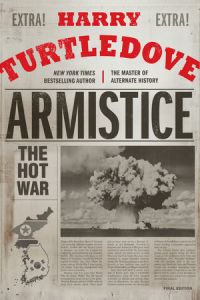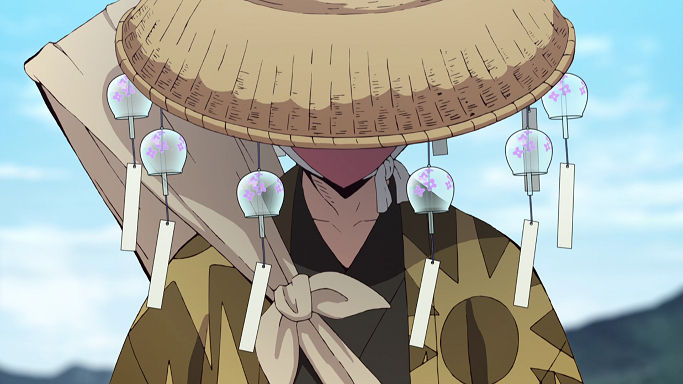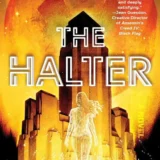 Armistice by Harry Turtledove is the third and final book in The Hot War trilogy that began in Bombs Away and continued with Fallout. In this timeline, President Truman ordered the use of nuclear weapons in Manchuria after Chinese troops were more successful in destroying American forces between the Chosin Reservoir and Hungnam. This caused the Soviet Union to retaliate by dropping their own atomic bombs on America’s allies. This nuclear tit-for-tat eventually ignited a ground war between American and Soviet forces in Europe.
Armistice by Harry Turtledove is the third and final book in The Hot War trilogy that began in Bombs Away and continued with Fallout. In this timeline, President Truman ordered the use of nuclear weapons in Manchuria after Chinese troops were more successful in destroying American forces between the Chosin Reservoir and Hungnam. This caused the Soviet Union to retaliate by dropping their own atomic bombs on America’s allies. This nuclear tit-for-tat eventually ignited a ground war between American and Soviet forces in Europe.
Armistice focuses on the conclusion of this war. Despite their nuclear attacks on America’s coasts, the Soviets haven’t been able to stop the American juggernaut from rolling back their front lines in Europe. Worse, their satellite states in Eastern Europe along with some of the outlying Soviet Republics are in open revolt. When an ambitious American plan knocks out an important Soviet leader (I’ll give you three guesses, but you will only need one comrade), chaos reigns in the Soviet government. As you can expect, the surviving Soviet leaders decide its better to cut their losses before there is nothing left of the Soviet Union to rule over and they agree to a (you guessed it) armistice. From the point of view of characters on both sides of the conflict, we see how the war winds down as armies are disbanded, prisoners return home and people just try to go on with their lives despite the millions of lives lost.
Now usually this is the part where I say something like “if you enjoyed the preceding books, you will enjoy this one”, but I don’t think I can say that about Armistice with complete certainty. The book was enjoyable at first, but the titular armistice happened pretty early on in the story and after that it just seemed like the plot was dragging its feet. While POV characters are always more interesting than others, there were a couple who I found a chore to get through. For example, by the end I was skimming through the Marian Staley storyline as I found her romance with Fayvl Tabakman to be rather dull. Turtledove has written some unconventional romances in the past, but this one just didn’t have that same spark.
There was also an annoying inconsistency involving there not being enough surviving members of Congress after the atomic bombing of Washington, DC for a quorum. At first, Harry Truman (also a POV character) says the correct procedure according the Constitution of the United States is that Senators can be appointed by their state governors to finish out the term, while Representatives need to be replaced through election. This is half true since Senators can be replaced that way, but the quorum needed in the House of Representatives can be reduced if seats are vacant so elections aren’t really necessary right away. This was made worse, however, when in a later chapter Truman says Representatives can be appointed by governors, not Senators (and I was reading out of a final copy so you can’t blame this on the review copy blues).
That said, when you judge Armistice in conjunction with The Hot War as a whole, I still think it deserves a recommendation. Although the last book was a tad disappointing, I still felt the series itself showcased a pretty realistic nuclear war in the 1950s (and here is hoping it doesn’t showcase a realistic nuclear war in the 2010s!). Could the concluding book have been better? Sure, in fact shrinking this series down to a duology and adding more ambiguity about the post-war world might have helped, but that is hindsight talking. Nevertheless, it is still full of sympathetic characters, exciting action and a dash of modern day social commentary that will make you go “I see what you did there”. If you are an alternate historian I can recommend reading The Hot War, but you will need to go into book three not expecting much.









